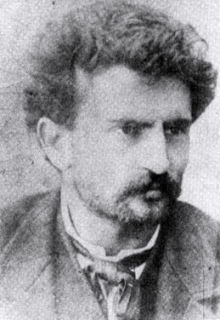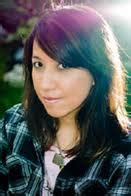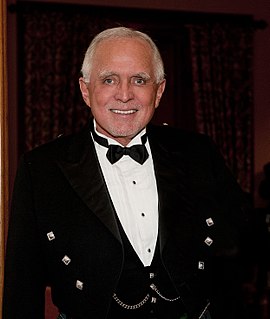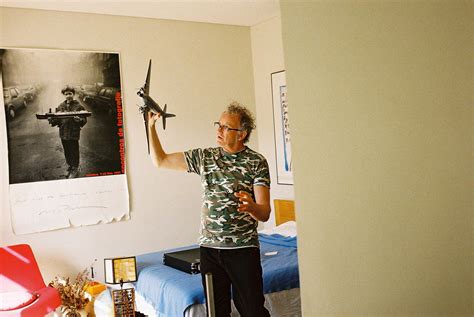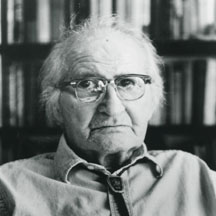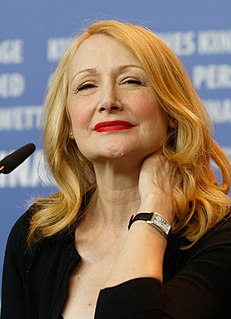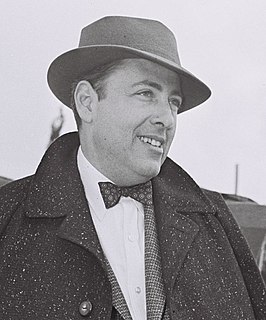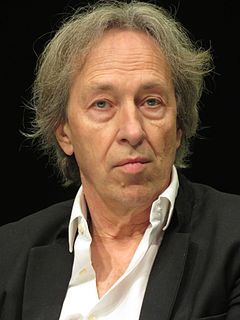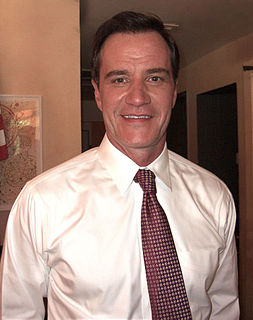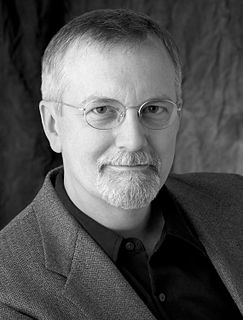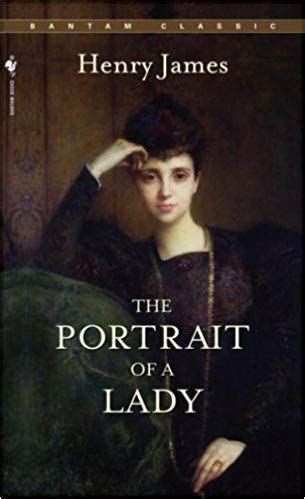Top 106 Milieu Quotes & Sayings - Page 2
Explore popular Milieu quotes.
Last updated on April 16, 2025.
In the anarchist milieu, communism, individualism, collectivism, mutualism and all the intermediate and eclectic programmes are simply the ways considered best for achieving freedom and solidarity in economic life; the ways believed to correspond more closely with justice and freedom for the distribution of the means of production and the products of labour among men. Bakunin was an anarchist, and he was a collectivist, an outspoken enemy of communism because he saw in it the negation of freedom and, therefore, of human dignity.
More attention to the History of Science is needed, as much by scientists as by historians, and especially by biologists, and this should mean a deliberate attempt to understand the thoughts of the great masters of the past, to see in what circumstances or intellectual milieu their ideas were formed, where they took the wrong turning or stopped short on the right track.
Enclosed within his artificial creation, man finds that there is “no exit”; that he cannot pierce the shell of technology again to find the ancient milieu to which he was adapted for hundreds of thousands of years . In our cities there is no more day or night or heat or cold. But there is overpopulation, thralldom to press and television, total absence of purpose. All men are constrained by means external to them to ends equally external. The further the technical mechanism develops that allows us to escape natural necessity, the more we are subjected to artificial technical necessities.
I think that most people don't think in terms of an American revolution, they think in terms of a Russian revolution, or even a Ukrainian revolution. But the idea of an American revolution does not occur to most people. And when I came down to the movement milieu seventy-five years ago, the black movement was just starting, and the war in Europe had brought into being the "Double V for Victory" [campaign]: the idea was that we ought to win democracy abroad with democracy at home. And that was the beginning of an American revolution, and most people don't recognize that.
Even if your novel occurs in an unfamiliar setting in which all the customs and surroundings will seem strange to your reader, it's still better to start with action. The reason for this is simple. If the reader wanted an explanation of milieu, he would read nonfiction. He doesn't want information. He wants a story.
Tobias Buckell combines old world with new in his novel CRYSTAL RAIN. While the rich cultures, drawn in part from Caribbean history and lore, echo a familiar landscape, he brings it out of the Earth milieu and into a bold new universe where technology and tradition collide. I enjoyed his colorful characters and musical use of language; his voice is fresh and entirely readable.
To create one must be able to respond. Creativity is the ability to respond to all that goes on around us, to choose from the hundreds of possibilities of though, feeling, action, and reaction and to put these together in a unique response, expression or message that carries moment, passion and meaning. In this sense, loss of our creative milieu means finding ourselves limited to only one choice, divested of, suppressing, or cendoring feelings and thoughts, not acting, not saying, doing, or being.
The Paleolithic hunters who painted the unsurpassed animal murals on the ceiling of the cave at Altamira had only rudimentary tools. Art is older than production for use, and play older than work. Man was shaped less by what he had to do than by what he did in playful moments. It is the child in man that is the source of his uniqueness and creativeness, and the playground is the optimal milieu for the unfolding of his capacities.
Philosophy appears to some people as a homogenous milieu: there thoughts are born and die, there systems are built, and there, in turn, they collapse. Others take Philosophy for a specific attitude which we can freely adopt at will. Still others see it as a determined segment of culture. In our view Philosophy does not exist.
I intend to discuss some perplexing issues which are raised once we embrace the hypothesis that society can be deschooled; to search for criteria which may help us distinguish institutions which merit development because they support learning in a deschooled milieu; and to clarify those personal goals which would foster the advent of an Age of Leisure (schole) as opposed to an economy dominated by service industries.
Your worst parts of your life, the things that you're ashamed of will become your strongest assets in a very quick amount of time. And the implication in that is your story is all that you have so passing it on to someone else who is struggling behind you coming up the ladder helps them. And so in the spirit of service in recovery we often talk about the power of our own stories to connect with other people and show them that they too can get well. I have found that not only is that true in the recovery world, but it is true in the social world in the social milieu in which I exist.
[My photography teacher] gave me the Mexican Day Books of Edward Weston and just blew me away with this work. The fact that you could be this fabulous visual artist, with all this milieu of people like Diego Rivera and you could sleep with these gorgeous, amazing women, that you could live that life - that photography could deliver you that life.
Detach the writer from the milieu where he has experienced his greatest sense of belonging, and you have created a discontinuity within his personality, a short circuit in his identity. The result is his originality, his creativity comes to an end. He becomes the one-book novelist or the one-trilogy writer.
We've learned a lot from the great psychologists. Wilhelm Reich wrote about the relationship between fascism and sexual repression. Freud rediscovered the underworld of consciousness that European rationalism had denied. But when you have a nation of people in therapy and counselling, "support" groups for every kind of human condition, where, in the clichés of that milieu, people "share" and "heal," the question, "What for?", "What now?" is no longer asked.
I try to take off the rose-colored glasses and view it in all facets, but I probably would be lying if I didn't say that probably the way in for a film with me is the performance. But I have been on juries where you have to give Best Screenplay, Best Cinematography. So you do have to put on several different hats and I try to broaden my scope. And what's great is, when you're in a room full of people who are not your milieu, so to speak, you find yourself speaking in a way that you do discover a slightly discerning eye.
Human life cannot be formless. We live by patterns. We move in comradeships. Conformity is evil when it distorts, flattens, and erases fruitful ways, strong ideas, natural identities; it is evil when it is a steamroller. But a man cannot escape being part of a milieu - and a recognizable part - unless he flees naked to a cave, never to return. The sensible thing is to use hard thinking to find the right way to live and then to live that way. What matters is living with dignity, with decency, and without fear.
Iron and coal dominated everywhere, from grey to black: the black boots, the black stove-pipe hat, the black coach or carriage, the black iron frame of the hearth, the black cooking pots and pans and stoves. Was it a mourning? Was it protective coloration? Was it mere depression of the senses? No matter what the original color of the paleotechnic milieu might be it was soon reduced by reason of the soot and cinders that accompanied its activities, to its characteristic tones, grey, dirty-brown, black.
The integration in Germany was made easier by the fact that I am probably of the third generation. So I have undergone a process of assimilation, of Jews into German society.I lived as a child in Germany, the feeling of being surrounded by people of whom the majority had very strong anti-Semitic sentiments. But there was one very odd thing in the whole milieu in which I lived: no one accepted the stigmatization. It is quite difficult. No one, my father for instance, would ever take it seriously. He would regard anti-Semites as people of no education.
What I’m trying to show is that the main event today is not seen by those of us that are living it… So it’s not the effect of [technology], it is that everything exists with-in [its milieu]. It's not that we use technology, we live technology. Technology has become as ubiquitous as the air we breathe, so we are no longer conscious of its presence.
I've had the opportunity to work with so many great directors. Different styles, as well, like Gus Van Sant. He just does the casting and the milieu and let's you do your thing, quietly. Bertolucci, who can talk to you about your internal world in quite a creative way or just say, 'Well, put your hand over here.'
In order to cultivate yourself and to drop no lower than the level of the milieu in which you have landed, it is not enough to read Pickwick and memorize a monologue from Faust... You need to work continually day and night, to read ceaselessly, to study, to exercise your will... Each hour is precious.
Universities are an example of organizations dominated wholly by intellectuals; yet, outside pure science, they have not been an optimal milieu for the unfolding of creative talents. In neither art, music, literature, technology and social theory, nor planning have the Universities figured as originators or as seedbeds of new talents and energies.
Signing to a major, there weren't many bands from our sphere that were doing it. I mean, obviously R.E.M. had done it, and Husker Du and the Replacements had done it, and maybe Soul Asylum, but that was probably about it. Those four bands were pretty much the only ones from that milieu that had signed to a major.
I have finally decided to write my book on the spiritual life. I mean to put down as simply as possible the sort of ascetical or mystical teaching that I have been living and preaching so long. I call it 'Le Milieu Divin,' but I am being careful to include nothing esoteric and the minimum of explicit philosophy.
Nuclear man is the man who realizes that his creative powers hold the potential for self-destruction. He sees that in this nuclear age vast new industrial complexes enable man to produce in one hour that which he labored over for years in the past, but he also realizes that these same industries have disturbed the ecological balance and, through air and noise pollution, have contaminated his own milieu.
I love everything that makes up a milieu, the rolling of the carriages and the noise of the workmen in Paris, the cries of a thousand birds in the country, the movement of the ships on the waters. I love also absolute, profound silence, and, in short, I love everything that is around me, no matter where I am.
Don't waste your time, do something worthwhile with it." But what can that mean: worthwhile? Finally to start realizing long-cherished wishes. To attack the error that there will always be time for it later....Take the long-dreamed-of trip, learn this language, read those books, buy yourself this jewelry, spend a night in that famous hotel. Don't miss out on yourself. Bigger things are also part of that: to give up the loathed profession, break out of a hated milieu. Do what contributes to making you more genuine, moves you closer to yourself.
I get letters every week from people who live in rural Texas or rural Mississippi and who feel totally alone. They feel like they must be the strangest person in the world. They don't fit in to the religious milieu of their communities. It doesn't make any sense to them. They read some of my columns and they know that there's somebody in the world at least as crazy as they are, and so they write and say is there anybody else?
When I was small child, all that belonged to conservative society was fashionable, and no republicans were welcome in the smartersalons. People living in such a milieu could imagine that the impossibility of ever inviting an "opportunist", much less a "radical", was a thing that would last forever, like gas lamps and horse-drawn omnibuses. But similar to kaleidoscopes turning from time to time, society successively places in various ways elements which were thought to be immutable and creates a new composition.
Jesus was a revolutionary, who did not become an extremist, since he did not offer an ideology, but Himself. He was also a mystic, who did not use his intimate relationship with God to avoid the social evils of his time, but shocked his milieu to the point of being executed as a rebel. In this sense he also remains for nuclear man the way to liberation and freedom.

